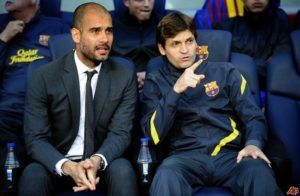Coming off of a disappointing third place finish in the 2007-08 campaign, Barcelona were looking to shake things up. This came with a huge summer of transfers and appointing a new manager in Pep Guardiola. Pep was a former player for FC Barcelona and had been the manager for Barcelona B the previous season as they gained promotion that year. Guardiola was molded as a player under the coaching of the great Johan Cruyff, as Cruyff moved Guardiola from winger to a pivot position in the center of the pitch during halftime of a youth game. How Cruyff saw the game shaped the mind of Pep the player and, most notably, Pep the coach.
Pep was brought in to help turn around FC Barcelona’s first team, and in doing so he re-introduced the totaalvoetball system that was instilled by his mentor Johan Cruyff. To make this system work the way that he wanted it to, Barcelona had to offload a lot of talent like: Ronaldinho, Deco, Edmilson (retired due to health issues but was on the way out), Zambrotta, and Giovani Dos Santos among others. Selling some of these players seemed questionable after their contributions to the teams success in the years past or their potential as young talent, but Guardiola was determined to get this team to play that he wanted.
Players were given more freedom to move around the pitch and open up the field of play for a more possession based game. He started Carles Puyol at right back while giving Yaya Toure the nod as a central defender; he gave Eto’o, Henry, and Messi freedom to rotate from striker to winger as they pleased; and he gave Xavi and Iniesta complete freedom when Sergio Busquets was instilled as the defensive stalwart in the midfield. Pep was less worried about specific positions in that season and more concerned with having the best players on the field at all times. The positions were able to shift seamlessly during this season and players were moving around the field and filling in holes as if it was their second nature. When they had possession the field was spread wide and high giving everyone space to move and create, but when they lost the ball you saw a tactical press that was keen on regaining possession as quickly as possible.
Watching this team play in their peak was as exciting and awe inspiring of a performance as you can get. The chemistry between each player on the pitch to work together to retain possession, hold a strong defensive shape, and absolutely dismantle a tightly held back line was jaw dropping. This change in system and the fluidity of the team led to a record breaking season, Pep led Barcelona to a treble and won a total of 6 trophies in the 2009 calendar year. Guardiola led the team to another Champions League Victory in 2011 before leaving the club after a short yet illustrious stint at the Nou Camp. Pep Guardiola changed the landscape for the next decade at FC Barcelona and paved the way for the success of other managers, but what he did after he left FC Barcelona is what changed the dominating tactical forces in all of Europe.
How Pep Guardiola’s Barcelona Reinvented Total Football
How Pep Guardiola’s Barcelona Reinvented Total Football
After departing from the Nou Camp, Guardiola was named as the manager for Bayern Munich. Munich was already dominating the German Bundesliga, but they wanted European dominance. While Guardiola was not able to achieve the great success of his days at Barcelona, he did change their philosophy to play more towards the old Dutch type of game. He solidified Lahm’s move to right fullback and did the same thing with David Alaba as a left fullback, he brought Thiago Alcantara along with him to be the midfield maestro that was trained in this system, and he brought in attacking players that could match the fluid movement that was the driving force in the final third at Barcelona. His days at the helm in Munich brought about change throughout the Bundesliga. Pep had revolutionized 2 different leagues in his first 2 managerial roles, but he was far from done.
Pep was about to take on his most recent, and possibly most revolutionizing role. He was announced as the new manager for Manchester City before the 2016-17 season. He spent massive amounts of money and brought in great talent to be a part of his team, but his first season was not considered a success by any stretch of the word. Manchester City did not win a trophy that year, while they participated in 4 competitions that could’ve ended with a trophy. The summer after his first season, Pep spent more money and brought in more great, young talent to his squad. This time, the money paid off. Pep’s Manchester City team dominated the league and did so playing a style that was atypical for the Premier League. Pep stuck to his roots and played the possession based attacking game, and used his tactical press to get the ball back quickly. Pep did not change the way that he played from the previous year or in either of his previous two managerial roles that he has had to achieve this success. This style has brought about imitators but none have been able to recreate the system of Pep Guardiola. But why can they not replicate his system?
The answer is easy. They don’t have Pep’s mind to run their system. He has been in this system since his youth days, he played in this system at the first team level, he coached his youth sides with this system, and he has never shifted his focus from his goal to play a beautiful style whenever he puts a team on the field. Barcelona changed the outlook of the game in 2008, but they only did so by giving one man a chance to be a first team manager. Pep Guardiola has changed the tactical landscape of the game globally, and we are lucky to witness one of the greatest minds tinker with different leagues and show how dominant one man can be all over the world.










Recent Comments